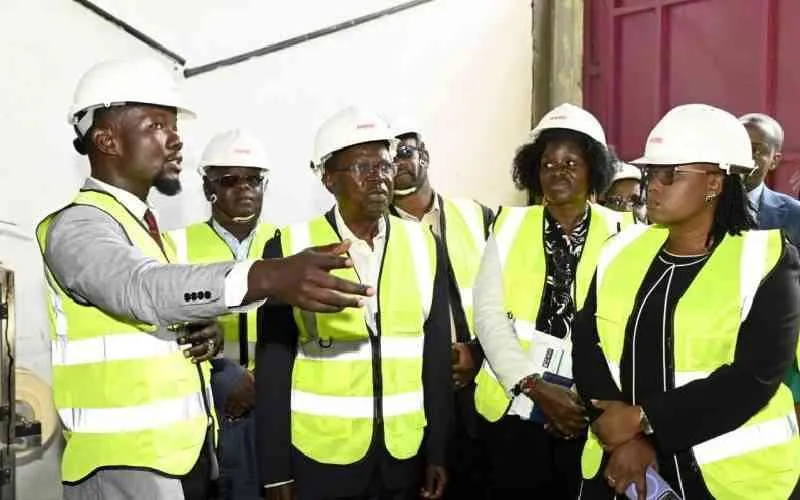In a significant stride towards Kenya’s green industrialisation ambitions, the Kenya Development Corporation (KDC) has partnered with private firm Timber Treatment International Ltd to commission an innovative biomass-based steam plant in Dandora, Nairobi. The project, financed in part through a strategic collaboration with the Export-Import Bank of India, marks a transformative step in reducing carbon emissions and decreasing the country’s reliance on fossil fuels while simultaneously boosting industrial efficiency and job creation.
A Landmark Project for Sustainable Industrial Growth
The newly launched steam plant is at the forefront of Kenya’s drive to modernise its manufacturing and industrial sectors under its Vision 2030 and the Bottom-Up Economic Transformation Agenda. Designed to integrate biomass-based steam production, the facility converts organic waste into energy, providing a cleaner and more sustainable power source for local industries.
KDC Chairman Sakwa Bunyasi, speaking at the commissioning event on March 26, 2025, underscored the significance of the project:
“The launch of this steam plant demonstrates our collective dedication to industrial transformation, environmental conservation, and job creation.”
Bunyasi’s remarks were echoed by KDC Director General Norah Ratemo, who highlighted that the investment aligns with national energy transition goals. “KDC’s investment in Timber Treatment International is a testament to our commitment to financing projects that not only drive green industrialisation but also deliver measurable benefits in terms of energy savings and reduced carbon footprints,” she noted.
Technological Innovations Driving the Project
The state-of-the-art plant leverages advanced biomass technology to generate steam for industrial applications. This method utilizes organic by-products, transforming them into a sustainable energy source that significantly cuts down on harmful greenhouse gas emissions. The project also incorporates cutting-edge Vapour Absorption Machine (VAM) chillers, which further enhance energy efficiency by reducing industrial electricity demand.
Key Technical Features
- Biomass-Based Steam Production: By converting agricultural and forestry residues into steam, the plant reduces reliance on fossil fuels and minimizes waste. This renewable approach not only mitigates environmental impact but also provides a cost-effective energy solution for local industries.
- Advanced Vapour Absorption Machine Chillers: These chillers offer substantial energy savings by optimising the cooling process. By harnessing waste heat from the steam generation process, they reduce overall energy consumption and operational costs.
- Emission Reductions and Energy Savings: The project is projected to cut over 7.3 million kilogrammes of carbon emissions annually, while delivering power savings exceeding 3.4 million units. These figures highlight the significant environmental and economic benefits of transitioning to cleaner energy solutions.
The incorporation of these innovative technologies is particularly significant given Kenya’s ongoing efforts to balance industrial growth with environmental sustainability. With industrial sectors facing increasing pressure to lower emissions, the steam plant serves as a model for future investments in renewable energy infrastructure.
Financing and Strategic Partnerships
The successful commissioning of the steam plant is underpinned by robust financial and strategic support. The collaboration with the Export-Import Bank of India has been instrumental in securing the necessary financing, highlighting the global nature of today’s sustainable investments. This international partnership not only reinforces the project’s financial viability but also underscores the growing recognition of green projects across continents.
Timber Treatment International, the private partner in this initiative, brings significant expertise in industrial processes and environmental management. Their involvement ensures that the plant operates at optimal efficiency while meeting stringent environmental standards. This partnership reflects a broader trend in which public and private sectors work hand in hand to achieve sustainable development goals.
Boosting Kenya’s Green Industrialisation Agenda
Aligning with Vision 2030 and the Bottom-Up Economic Transformation Agenda
Kenya’s Vision 2030 is a comprehensive plan aimed at transforming the nation into a newly industrialising, middle-income country. A critical pillar of this vision is the promotion of sustainable and inclusive industrial growth. The new steam plant is a tangible outcome of these policies, offering a dual benefit of industrial efficiency and environmental protection.
The Bottom-Up Economic Transformation Agenda further complements this vision by focusing on grassroots development and empowering local communities. By investing in projects that foster job creation and skill development, the steam plant is expected to have a ripple effect across the manufacturing ecosystem. Industries such as New Kenya Cooperative Creameries, among others, stand to benefit from the reliable, cost-effective energy solutions provided by the plant.
Environmental and Social Impact
The benefits of the project extend well beyond the immediate industrial applications. The reduction in carbon emissions contributes to Kenya’s broader climate change mitigation efforts, aligning with international commitments under agreements such as the Paris Accord. Moreover, the plant’s sustainable energy output supports the development of local communities by improving air quality and reducing the health hazards associated with fossil fuel combustion.
Local stakeholders are also expected to gain from job creation and skills development initiatives associated with the project. The plant’s operation and maintenance require a skilled workforce, presenting opportunities for local talent to engage in high-value industrial and technical roles. This focus on human capital is a crucial element in ensuring that Kenya’s industrial growth is both sustainable and inclusive.
A Broader Perspective: Green Energy Trends in Africa
The Role of Biomass Energy in the Global Transition
Biomass energy is emerging as a key component in the global transition towards cleaner, renewable energy sources. In many developing countries, including Kenya, biomass offers an accessible and efficient way to harness locally available resources. Unlike solar or wind energy, which require specific geographic conditions, biomass energy can be generated from a wide range of organic materials, making it an attractive option for countries with significant agricultural and forestry sectors.
Globally, biomass energy has seen increased investment as part of a broader strategy to reduce carbon emissions and promote energy security. Several studies have shown that biomass-based systems not only reduce reliance on fossil fuels but also help to manage waste more effectively, creating a circular economy that benefits both the environment and local economies.
Regional Success Stories and Comparative Insights
Kenya is not alone in its pursuit of biomass energy solutions. Several African nations are exploring similar projects to diversify their energy mix and reduce environmental impact. For example, South Africa has made notable progress in integrating biomass into its energy portfolio, particularly in the context of rural electrification and industrial applications. Likewise, Nigeria has initiated biomass projects aimed at reducing waste and improving energy access in underserved regions.
In this context, the KDC and Timber Treatment partnership represents a significant step forward for Kenya. The project not only positions the country as a leader in green industrialisation within the region but also serves as a benchmark for other nations seeking to implement similar sustainable energy projects. By leveraging locally available resources and advanced technologies, Kenya is setting a strong example of how emerging economies can transition to cleaner energy while driving industrial growth.
Economic Implications and the Future of Industrial Energy
Enhancing Operational Efficiency and Competitiveness
For many industries, energy costs represent a significant portion of operational expenses. By providing a steady and cost-effective source of steam through biomass, the new plant is poised to reduce these costs significantly. Lower energy expenses translate into increased competitiveness for local manufacturers, allowing them to invest more in innovation, research, and expansion.
The energy savings achieved through the advanced Vapour Absorption Machine chillers further amplify these benefits. Reduced electricity demand not only lowers operating costs but also contributes to the overall stability of the national grid. As industries become more energy-efficient, the cumulative effect on the economy could be substantial, boosting productivity and fostering a more resilient industrial base.
Job Creation and Skill Development
One of the most humanising aspects of the project is its potential to create employment opportunities. The construction, commissioning, and ongoing operation of the steam plant require a diverse range of skills—from engineering and technical maintenance to administrative and managerial roles. This demand for skilled labour offers a platform for local talent to enhance their expertise, supported by targeted training and development programmes.
Daisy Kiplagat, General Manager at New Kenya Cooperative Creameries, emphasized the positive impact on employment:
“This investment is not just about energy efficiency—it’s about empowering our workforce and driving sustainable growth. With reliable, green energy solutions, we are better positioned to expand our operations and create more jobs.”
By fostering a culture of innovation and continuous learning, the project contributes to a broader narrative of inclusive economic development, ensuring that the benefits of industrial transformation are shared across communities.
Financing Green Initiatives: A Model for Sustainable Investment
International Collaboration and Funding Mechanisms
The financing of the steam plant through a collaboration with the Export-Import Bank of India underscores the importance of international partnerships in advancing green projects. Such collaborations enable emerging economies like Kenya to access the capital and expertise required to implement large-scale renewable energy projects. The involvement of the Export-Import Bank of India is particularly noteworthy, as it reflects a growing trend of cross-border financial cooperation aimed at promoting sustainable development.
This model of financing, which leverages both public and private sector resources, provides a blueprint for other nations looking to fund similar initiatives. By combining domestic policy support with international investment, Kenya is setting a precedent for how green industrialisation can be financed in a cost-effective and scalable manner.
The Economic Rationale Behind Sustainable Investments
From an economic standpoint, investments in renewable energy projects offer multiple benefits. They reduce operational costs, create jobs, and drive technological innovation. Furthermore, by mitigating the environmental impact of industrial activities, such projects help to avoid the long-term costs associated with pollution and climate change. In the case of the KDC and Timber Treatment steam plant, the projected reduction of over 7.3 million kilogrammes of carbon emissions and significant power savings illustrate the tangible economic benefits of green investments.
These benefits extend to the broader economy as well. As industries become more energy-efficient and cost-competitive, the national economy can expect a boost in productivity and growth. This, in turn, creates a virtuous cycle where sustainable practices drive economic success, which then fuels further investments in green technology and infrastructure.
Human Stories Behind the Industrial Transformation
Empowering Local Communities
Beyond the technical and financial achievements, the steam plant is a story of community empowerment and transformation. Dandora, a suburb of Nairobi often associated with challenges related to waste management and environmental degradation, is now at the heart of a green revolution. Local communities are witnessing firsthand the benefits of sustainable industrialisation as cleaner air, improved public health, and increased job opportunities become part of the everyday narrative.
Community leaders have expressed optimism about the long-term impact of the project. With improved energy solutions powering local industries, there is a renewed sense of hope that sustainable growth will bring broader social and economic benefits to residents. Educational institutions in the area are already exploring partnerships with KDC and Timber Treatment to develop training programmes that equip young people with the skills needed for jobs in the renewable energy sector.
The Human Touch in Corporate Initiatives
The involvement of key stakeholders such as Sakwa Bunyasi and Norah Ratemo reflects a deep commitment to not only achieving economic success but also ensuring that such success translates into tangible benefits for people. Their leadership has been instrumental in championing projects that are both economically viable and socially responsible. Through initiatives like the steam plant, Kenya is paving the way for an industrial future that prioritises environmental conservation, job creation, and community well-being.
These human elements are central to the story of Kenya’s green industrialisation. The transformative power of sustainable investments lies not just in their economic metrics, but in the lives they touch and the communities they uplift. As the steam plant begins operations, it stands as a testament to the belief that industrial progress and environmental stewardship can—and must—go hand in hand.
Looking Ahead: The Future of Green Industrialisation in Kenya
Scaling Up and Replicating Success
The commissioning of the biomass steam plant is just the beginning. Industry experts believe that this project could serve as a catalyst for further investments in renewable energy across Kenya and the broader East African region. With its proven benefits in reducing carbon emissions, lowering energy costs, and enhancing operational efficiency, the plant is a model that can be replicated in other industrial hubs.
Government officials have already indicated plans to explore similar partnerships in other sectors, from agro-processing to textile manufacturing, where energy efficiency is crucial. The success of this project will likely spur additional research and development in biomass technology and other renewable energy sources, positioning Kenya as a leader in the region’s green industrial revolution.
Policy Implications and Future Investments
Kenya’s commitment to sustainable development is also evident in its progressive policies and regulatory framework. The government has been actively encouraging private sector participation in green projects through incentives and favourable financing conditions. Such policies not only attract foreign investment but also stimulate local innovation, creating an ecosystem where sustainable practices can thrive.
As policymakers continue to refine strategies to combat climate change and promote renewable energy, the steam plant’s achievements will provide valuable insights into the practical benefits of these initiatives. Data on emission reductions, energy savings, and economic impacts will inform future policy decisions, ensuring that Kenya remains on track to meet its ambitious Vision 2030 targets.
Conclusion
The launch of the biomass steam plant in Dandora is a milestone that encapsulates Kenya’s ambition to drive industrial transformation through sustainable innovation. By harnessing the power of biomass and integrating advanced energy-saving technologies, the project delivers on multiple fronts—reducing carbon emissions, cutting energy costs, and creating new job opportunities. The collaboration between Kenya Development Corporation, Timber Treatment International, and international financiers like the Export-Import Bank of India is a model of strategic partnership, blending technical expertise with a commitment to social and environmental progress.
Key takeaways from the project include:
- Environmental Impact: The plant is set to reduce over 7.3 million kilogrammes of carbon emissions annually, contributing significantly to Kenya’s climate change mitigation efforts.
- Energy Efficiency: Advanced Vapour Absorption Machine chillers and biomass steam production technology deliver power savings that enhance industrial competitiveness.
- Economic and Social Benefits: The initiative bolsters Kenya’s manufacturing sector, creates jobs, and supports local communities by improving air quality and promoting sustainable growth.
- Strategic Partnerships: The collaborative model involving KDC, Timber Treatment International, and international financing partners sets a benchmark for future green investments in emerging economies.
As Kenya continues to forge its path toward green industrialisation, projects like the new steam plant offer a glimpse into a future where economic development and environmental stewardship work in harmony. The human stories behind this transformation—of empowered communities, dedicated leaders, and a shared commitment to sustainability—remind us that the true measure of progress lies not only in economic metrics but in the improved quality of life for all citizens.
In the face of global challenges such as climate change and energy insecurity, Kenya’s forward-thinking approach serves as an inspiration. By embracing innovative solutions and forging strategic partnerships, the country is not only securing its own future but also contributing to a more sustainable and resilient global economy.
As the steam plant begins operations, it marks the start of a new chapter in Kenya’s industrial evolution—one that is rooted in environmental responsibility, economic dynamism, and the relentless pursuit of a better tomorrow.
Ready to take your career to the next level? Join our dynamic courses: ACCA, HESI A2, ATI TEAS 7 , HESI EXIT , NCLEX – RN and NCLEX – PN, Financial Literacy!🌟 Dive into a world of opportunities and empower yourself for success. Explore more at Serrari Ed and start your exciting journey today! ✨
photo source: Google
By: Montel Kamau
Serrari Financial Analyst
27th March, 2025
Article, Financial and News Disclaimer
The Value of a Financial Advisor
While this article offers valuable insights, it is essential to recognize that personal finance can be highly complex and unique to each individual. A financial advisor provides professional expertise and personalized guidance to help you make well-informed decisions tailored to your specific circumstances and goals.
Beyond offering knowledge, a financial advisor serves as a trusted partner to help you stay disciplined, avoid common pitfalls, and remain focused on your long-term objectives. Their perspective and experience can complement your own efforts, enhancing your financial well-being and ensuring a more confident approach to managing your finances.
Disclaimer: This article is for informational purposes only and does not constitute financial advice. Readers are encouraged to consult a licensed financial advisor to obtain guidance specific to their financial situation.
Article and News Disclaimer
The information provided on www.serrarigroup.com is for general informational purposes only. While we strive to keep the information up to date and accurate, we make no representations or warranties of any kind, express or implied, about the completeness, accuracy, reliability, suitability, or availability with respect to the website or the information, products, services, or related graphics contained on the website for any purpose. Any reliance you place on such information is therefore strictly at your own risk.
www.serrarigroup.com is not responsible for any errors or omissions, or for the results obtained from the use of this information. All information on the website is provided on an as-is basis, with no guarantee of completeness, accuracy, timeliness, or of the results obtained from the use of this information, and without warranty of any kind, express or implied, including but not limited to warranties of performance, merchantability, and fitness for a particular purpose.
In no event will www.serrarigroup.com be liable to you or anyone else for any decision made or action taken in reliance on the information provided on the website or for any consequential, special, or similar damages, even if advised of the possibility of such damages.
The articles, news, and information presented on www.serrarigroup.com reflect the opinions of the respective authors and contributors and do not necessarily represent the views of the website or its management. Any views or opinions expressed are solely those of the individual authors and do not represent the website's views or opinions as a whole.
The content on www.serrarigroup.com may include links to external websites, which are provided for convenience and informational purposes only. We have no control over the nature, content, and availability of those sites. The inclusion of any links does not necessarily imply a recommendation or endorsement of the views expressed within them.
Every effort is made to keep the website up and running smoothly. However, www.serrarigroup.com takes no responsibility for, and will not be liable for, the website being temporarily unavailable due to technical issues beyond our control.
Please note that laws, regulations, and information can change rapidly, and we advise you to conduct further research and seek professional advice when necessary.
By using www.serrarigroup.com, you agree to this disclaimer and its terms. If you do not agree with this disclaimer, please do not use the website.
www.serrarigroup.com, reserves the right to update, modify, or remove any part of this disclaimer without prior notice. It is your responsibility to review this disclaimer periodically for changes.
Serrari Group 2025
















